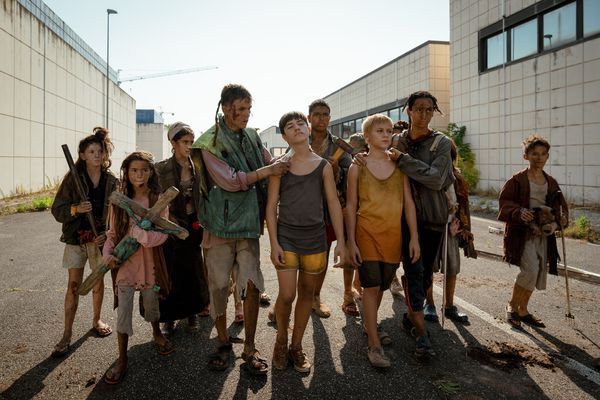 |
| Mondocane Photo: courtesy of Kino Lorber |
Italian director Alessandro Celli's début feature Mondocane transforms the Taranto landscape of southern Italy into a dystopian vision. Trapped in this space, his two young protagonists, Pietro (Dennis Protopapa), known as Mondocane, and Cristian (Giulano Soprano), known by the name Pisciasotto, dream of escaping the toxic wasteland. When the two best friends are recruited by Testacalda, a.k.a Hothead (Alessandro Borghi), leader of a local gang called the Ants, their bond is tested.
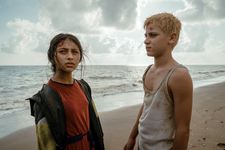 |
| Mondocane |
In conversation with Eye For Film, Celli discussed his ambition to diversify from Italian crime traditions, and the uncertainty around the response the film will provoke.
Paul Risker: Why filmmaking as a means of creative expression? Was there an inspirational or defining moment for you?
Alessandro Celli: It was very early on, growing up in Rome with a Canadian father. I'd go to the one theatre in Rome that was playing films in English. It was a daily thing, we’d go all the time, and I loved the way stories were told.
I studied business, then I studied at the London Film School (LFS), which was an important moment. I knew I wanted to tell some stories in Italian to start my career, with the idea that you could make a different type of film compared to the usual début film that has constraints around producing rules, and dogmas.
It was a long process, but then this brave producer, Matteo Rovere, who’s trying to create a little revolution in Italy with his Groenlandia film company, including his own films, and other ideas, that allow for a creativity and world building.
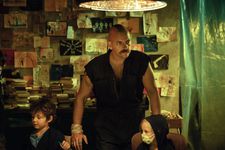 |
| Mondocane |
PR: World building is an important part of Mondocane. When we're young we're great at creating worlds in our heads, that we express through play. As adults we nurture it through creative forms of expression such as cinema. As our relationship to creativity changes with age, cinematic and literary storytelling legitimises the imagination we carry over from childhood and adolescence.
AC: It's the theme of the film and many of my short films are coming-of-age stories. Mondocane is about an age of innocence that goes by very quickly in this desperate world, where an opportunity to grow up arises.
It was important to make it an extremely simple world of friendship, a house, money, and the gang, the Ants, which is the goal of finding a new home. What else would you want to be happy when you're that age and you've suffered so much? It's about the dream, and that's why I tried to make a crime story that would be different to the ones I'm accustomed to watching in my country. We’re full of these mafia stories, and whether or not it inspires television or film, it's still gloomy.
I understand it, but I thought being in the shoes of two thirteen-year-olds who have made their dream come true is nice, and it’s also nice to find out out that you're not as similar to your friend as you thought. To find out there’s something truly different in your own soul, your own person, and that's the coming-of-age moment that I wanted to discuss in the film.
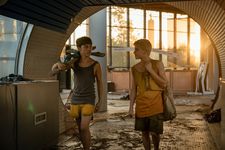 |
| Mondocane |
PR: It's all about individuality, and as an audience we can be precious. We want to see things continue, to stay intact, but like so many things in life there’s a beginning and an end. We watch films with a certain sentimentality, that exposes a naïve hope present in our souls.
AC: You are outlining the sentimental aspect – it was one of the main goals. There are moments that can distract you from this certain point-of-view because there are those scenes that were meant to be spectacular and shocking. The landscape of Taranto is transformed into something extremely dystopian, and locally at least, it’s a strong image for us.
The film was always the story of two friends, and it was clear to me that the ending could be unpredictable for the audience - whether you were going to accept the decisions made by the boys. If you feel something for them, then you will not judge them, you'll accept that they learned something about their lives.
It's all pretty inevitable, and I don't think there's anything I’d do different if I was in the anthill. I would be either Pisciasotto or Mondocane.
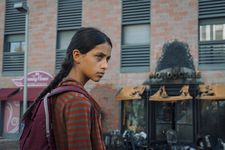 |
| Mondocane |
PR: Comparisons have been drawn to Mad Max and Lord Of The Flies, although the inspirations perceived by the audience may not be legitimate influences. What film and literary works influenced your vision for Mondocane?
AC: … I used a lot of inspiration, it's no mystery. I've a long list of titles of stuff. What I found out was there are lots of things that are pretty subconscious that people will reference, and you'll say, "No, I didn't think of that.” I'll give you an example. Someone came up to me and said, "Oh, I really appreciated that you took inspiration from Akira.” I said, “No”, but then thinking about it, Akira is this film where there's old Tokyo and new Tokyo, and there’s a gang on bikes. It’s a film I grew up with, and it's somehow a big influence, but I honestly never thought about it as I writing, or, directing.
Okay, you have to talk about Mad Max. It's the immediate reference everybody comes up with, and Lord Of The Flies. I do appreciate that because they're two important films - one is an incredible literary masterpiece and a film. It seemed important to make whoever finds these matches comfortable with the material, and even now, it's marketed this way in North America.
I needed more of a structure and the real storyline that helped me was Oliver Twist, although Lord Of The Flies is very political, and Mondocane has been associated with a political view. Golding’s story is a world with kids, but no adults, and my adult is very important, he's a Fagin.
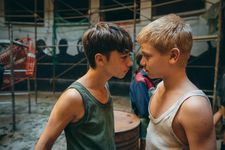 |
| Mondocane |
The political part of Lord Of The Flies and Mad Max’s dystopia, sure. Mad Max is the biggest example of a dystopia and it's wild, but my film doesn’t have that much action.
PR: Looking back on the experience of writing and directing your feature debut, how comfortable were you with that moment of letting go of the film to find its place? I remember Larry Fessenden describing it to me as an act of abandonment, and I wonder if you’d agree with that sentiment?
AC: My concern was that I’d speak the language of genre, but I still had to present myself and my opinion on what I think of filmmaking, while making a debut film of this kind, which doesn't have many other previous examples.
The film definitely has a life of its own and while you're making the film it's just yours. Then, as you start to get into the editing room, it becomes everybody's film, amongst those who made it. You start getting that distance, but you're still in the closed room with people that have believed in you.
I remember saying to Matteo, "We don't even know what the potential is. We just think something about this film.” I’d learned this lesson in short films, through the long process of going to film festivals and being surprised by their results.
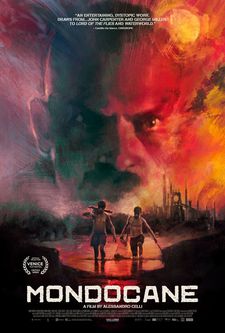 |
| Mondocane poster |
You have no idea when you're shooting the film who it’ll emotionally strike, or, inspire. I found out some short films were used in film schools. No one asked permission, because you know it's a free world. You just go online, whether it's Vimeo, or, YouTube, or, even DVDs – they just circulate.
Somebody told me and I was happy and surprised. I’d zero control over that and it’s like giving a life to something, and this life could either be a good, or, a bad life, but you don't have much control.
Do you have to let it go? Yes, absolutely, but you want to protect it. It sounds familiar to how we think about our dear ones. You need to help them be free, but you also want to keep them safe. Some decisions may be terrible for a film, and some are not in your power, even though you’re the writer, or, director. Again, life is that way.
Ultimately I'd say you wish for the best of luck because it’s important that it has a long and healthy life, but the roots have to be healthy. I don't think you'd go far if it was a shallow and a cold experience. Someone will pick it up somewhere as long as it exposes what you are truly after.
Mondocane opened in San Francisco on 20 May.





















